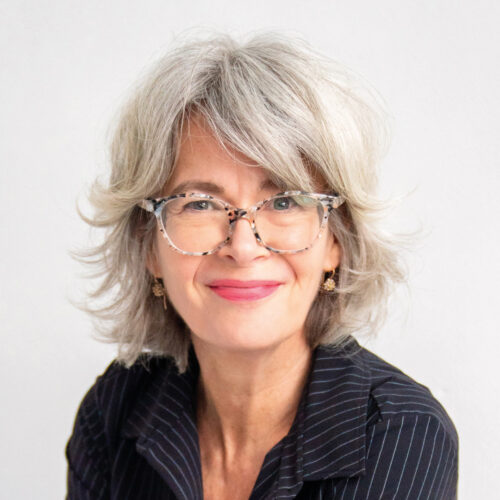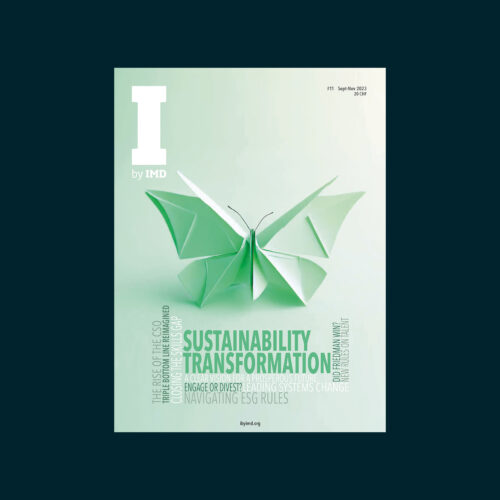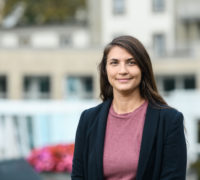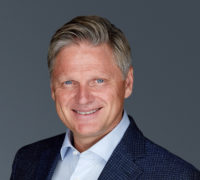
Six books on AI written by intelligent humans
The old-fashioned printed word offers valuable insight on the latest technology. Here is our guide....

by Amanda Williams, Knut Haanaes Published 16 October 2023 in Sustainability • 10 min read •

Anthropocene, a new geological epoch, has been created by the damaging impact of humans, say scientists. Image: Joshua Brown/Unsplash
Natural scientists propose that we have entered the Anthropocene, a new geological epoch created by the damaging impact of humans. Since the Industrial Revolution, our activities have been the main driver for Earth system changes and are responsible for pushing our use of resources beyond planetary boundaries.
If collective industrial impacts have fundamentally altered the Earth’s systems, then collective efforts are needed to ensure we do not go beyond sustainable limits. This calls for the transformation of entire sectors and all companies working along the same supply chain. For example, restoring biodiversity in a given geographical region will require every firm that depends on the natural resources in the area to change their practices. Also, reducing Greenhouse Gas Protocol Scope 3 emissions along the supply chain requires the cooperation of companies both up and downstream.
To tackle these challenges, specific roles designed to lead systems change are becoming more widespread. Leaders of systems change initiatives have a difficult task – they have to mobilize loosely coupled, diverse actors to solve broad long-term social or environmental issues without any formal control or power.
To better understand this emerging role and what it takes to drive change at this scale, we spoke to the following four leaders of systems change representing the private, public, nonprofit, and academic sectors: Christine Diamente of the sustainable business consultancy BSR, Rasmus Valanko of the We Mean Business Coalition (WMBC), Peter White, Professor of Practice, Business and Diversity at the University of Exeter in the UK, and Gail Whiteman, an executive director Arctic Basecamp.
Five key factors in leading effectively for systems change emerged from their collective experiences and approaches:

Diamente leads BSR’s Business Transformation team, helping companies manage sustainability throughout their business and across their supply chains and to develop resilient business strategies. She brings over 20 years of experience in leading brand, sustainability, public affairs, communications, and reputation management with multinational corporations at the executive leadership level. Her role includes overseeing corporate relations with external stakeholders, such as the World Economic Forum (WEF), the UN, European institutions, and investors.
System leaders must begin their task by seeking to understand the complex social and ecological problems they are trying to solve. They base this initial analysis on science and research. All of our interviewees said starting with a holistic view of the problem based on the facts was key. White recommended focusing on the systems level – such as those covering energy or food – instead of the sector or value chain level. Many sectors are interconnected and are subsystems of (and depend upon) the larger systems in which they are embedded.
If we can change the underlying incentives or the root causes of the unsustainability of those broader systems and the way they work, then sectoral and value chain change will follow, White explained. For example, leading up to the 2015 COP21 climate negotiations in Paris, the World Business Council for Sustainable Development (WBSCD) gathered the voice of business to demonstrate business solutions that could justify stronger climate policies and commitments. The resulting Paris Agreement has served as the foundation for ambitious climate action, such as the Science Based Targets initiative that provides companies with a framework to set long-term climate targets in line with the goal of keeping temperature change within 1.5°C above pre-industrial levels. A similar process for biodiversity is currently underway: Business for Nature is bringing the voice of business to the UN biodiversity conferences to advocate for stricter biodiversity reporting and disclosure requirements.

At WMBC, a global nonprofit coalition, Valanko works to implement systemic change by working with companies and partner organizations on climate change. Before joining WMBC, he led the sustainability transformation of the chemical company Kemira, acting as Director for Corporate Sustainability. He has directed several business collaboration initiatives at the World Business Council for Sustainable Development (WBCSD) where he led the climate and energy program. His background includes climate change and strategy work at Royal Dutch Shell as well as multilateral environmental agreement negotiations with the government of Finland. Valanko brings a wealth of knowledge on sustainability from the private, public, and NGO sectors.
Beyond this analysis, there needs to be an effective, intermediary translator between science and the collective mass to drive change. The most important aspects of the holistic systems understanding need to be simplified and communicated to key stakeholders. Our experts said finding the right balance between simplicity and complexity could be challenging and required some iteration to get right.
Valanko said: “The challenge you always have is how much do you simplify so that you’re able to take decisions and communicate those to the people that you need to bring on the journey with you, versus how much complexity do you retain to ensure that you do actually go in the exact right direction? I think that’s the piece where the actual word leadership comes in. Leadership isn’t just about knowing where to go, it’s about how many people you bring with you.”
For example, in his work at Kemira, there were multiple different stakeholder perspectives that he could use as a lens to understand how the chemical industry would evolve across several countries over the next decades. Complex technological, economic, political, and environmental factors all needed to be taken into account. These factors complicate all sustainability-related leadership decisions. Valanko chose to focus on the consumer perspective and integrate climate change into strategy. This strategic direction paved the way for sustainability as a whole to be integrated into the core strategy.
Whiteman founded Arctic Basecamp because she felt there was a need to translate complex system dynamics based on natural science to decision-makers.
“We needed to get a much more direct communication line between scientists – particularly natural scientists that knew about systemic global risks that would happen in the future – and those actors that had power that could make decisions to either adapt or mitigate to those risks,” she said.
Arctic Basecamp curates scientific data, then translates and communicates it in a way that everyone can understand. It then designs data visualizations to share the information broadly in new ways. For example, the Arctic Sea Ice Meltometer lets users interactively explore how greenhouse gases across the globe are contributing to Arctic Sea ice melt.
Through effective communication, the initial systems view forms the basis for a long-term shared, pliable, and broad vision that diverse stakeholders can get behind. “A key skill of systems leaders is being able to bring people together from very different viewpoints,” said Whiteman.

White is a sustainability leader and biologist with experience leading organizations, research, policy work, and teaching in global corporations, international NGOs, and academia. For more than seven years, he was responsible for WBCSD’s work programs in climate and energy, food, land and water, cities, people, and the circular economy, redefining value, and sector projects in chemicals, forestry, cement, and tires. Previously, he led the sustainability approach for the world’s largest consumer goods company as Director for Global Sustainability, creating the company’s long-term vision and sustainability goals.
The next step is to identify the levers of change or the concrete actions and solutions that will drive change on the ground. White said these levers were hindering business progress, and which, if altered, might help drive progress forward. All our experts said the initiative they were leading had a set of core competencies and resources that served as the foundation for the change lever. For example, WMBC specializes in creating “ambition loops” where evidence of business action provides confidence for policymakers to increase their own ambition. Meanwhile, Arctic Basecamp leverages science to change information flows and influence decision-makers. Each organization or initiative has its own unique role to play in systems transformation.
Collaboration is key in this step because the systems change initiative may not have all the resources needed. Deciding which collaborations to engage in depends on what resources are already available and what resources need to be acquired through partnerships. All our interviewees expressed the need to collaborate with other systems-changing organizations.
“Each organization will have a unique angle to help tackle today’s challenges, and we do broadly collaborate by connecting those different angles for systemic change,” said Diamente. For example, WMBC is a coalition founded by seven non-profit organizations including BSR and WBCSD to deliver key climate initiatives aggregating business either behind demand side market signals or representing the voice of business at key international forums such as the G7, the G20, or the UN climate negotiations.

Whiteman is the Founder of Arctic Basecamp, a registered not-for-profit science outreach platform that brings a message to the WEF annual meeting at Davos on the global risk to the Arctic. In 2022, she launched an online Arctic Risk Platform (www.arcticrisk.org) to curate the latest scientific information on how the Arctic drives global risks for key target audiences, including businesses. Whiteman is a social science expert on how decision-makers make sense of systemic global risks from climate change and other environmental threats. Since 2012, she has been the Professor-in-Residence at the WBCSD and is actively involved in building science-based targets for collective business action.
When designing interventions, the interconnections between the issues need to be considered. “We know that these challenges are crossing together,” said Diamente. “For example, we no longer just talk about climate change – we also look at the nexus between climate and social factors such as the just transition or climate justice or the link to health equity, human rights, and climate change.”
As Valanko explained: “Climate change can cause a drought that causes social unrest in the Middle East, which causes immigration, which then causes political upheaval in Europe.” Systems leaders need a broad scope and systems thinking to make sense of and account for those interconnections.
He said his team also considered local political, economic, technological, and social factors when deciding on interventions. For example, the energy pathway for Brazil would be very different from that of Japan. These additional factors help determine the local possibilities and realistic options for systems interventions.
Systems leaders can’t repeat what was done in the past because the actions of the past have created the social and ecological problems that we face today. Systems change requires doing things differently, continuous evaluations of the situation, and readjustments: it is a learning process.
“If we don’t experiment and track it, we do exactly what we have done in the past, which was mostly incremental change,” said Whiteman.
Some actions will fail, and there will be a need to unlearn things. Systems leaders will have to settle for less than perfection due to the complexity and scale of the challenges they face. White said leaders should not wait for perfect “because if you wait for something to be perfect, you’ll never do anything in this area”.

No organization can escape the need to transform to become more sustainable. The need to act is urgent. It calls for strong leadership, difficult decisions, and deep cultural change. In Issue XI, we explore how to build sustainable organizations to succeed in turbulent times.
There was “no perfect roadmap, especially in this age of continuous disruption”, said Diamente. “You need a roadmap that enables resilience and connects accountabilities across the organization all the way up to the board.” To help companies focus and prioritize what really matters in the age of disruption, she supports companies’ “double materiality” assessments that examine both enterprise value and the impact on society and the environment.
“Every single thing I’ve worked on, I’ve never got it right the first time,” said Valanko. “It’s about iteration. The key thing is to not fear getting it wrong. Systemic change requires you to be comfortable with getting it wrong, and iterating until you get it right.” For example, in his work at Royal Dutch Shell, it took several iterations to find the trigger and supporting analysis that could successfully convince the executive team to invest in electric mobility.
Success can be measured in many different ways and means many different things. For example, organizational-level success might mean achieving important milestones or reaching a certain amount of people with communication efforts. When defining success, White and Valanko both referred to reaching a tipping point where momentum starts to gather pace in the right direction. White said: “Are you still pushing water up the hill? Or do you have the right incentives in place so that the water is running down the hill in the right direction?” Valanko’s team judges the tipping point based on the number of companies that are aligned with science-based targets for climate action.
The social and environmental challenges we face present a significant opportunity to lead in different ways. Without systems change efforts and bold leaders driving them, we risk falling short of important global targets such as the UN Sustainable Development Goals. We hope that these insights from our conversations with leaders for system change will help inspire others to change the world.

Research fellow at IMD Business School
Amanda Williams is a research fellow at IMD Business School. She was formally a senior researcher at ETH Zurich, a research fellow at Copenhagen Business School, and a Research Associate at the World Business Council for Sustainable Development where she worked on the SDG Compass, a guide for corporate action on the SDGs. Her research focuses on how organizations understand global sustainability issues and develop corporate sustainability strategies that align with global sustainability targets.

Lundin Chair Professor of Sustainability at IMD
Knut Haanaes is a former Dean of the Global Leadership Institute at the World Economic Forum. He was previously a Senior Partner at the Boston Consulting Group and founded their first sustainability practice. At IMD he teaches in many of the key programs, including the MBA, and is Co-Director of the Leading Sustainable Business Transformation program (LSBT) and the Driving Sustainability from the Boardroom (DSB) program. His research interests are related to strategy, digital transformation, and sustainability.

30 April 2024 • by Öykü Işık in Audio articles
The old-fashioned printed word offers valuable insight on the latest technology. Here is our guide....

29 April 2024 • by George Kohlrieser in Audio articles
Expert guidance on how and when to make concessions to foster healthy relationships and encourage a collaborative working environment....
 Audio available
Audio available
26 April 2024 • by Angelica Adamski in Audio articles
Executive coach Angelica Adamski shares the challenges facing Lyndsey in aligning and leading a new and globally dispersed sales team....
 Audio available
Audio available
23 April 2024 • by Jerry Davis in Audio articles
GenAI can deliver cost and productivity benefits for colleges and students, but there is a dark side....
 Audio available
Audio availableExplore first person business intelligence from top minds curated for a global executive audience